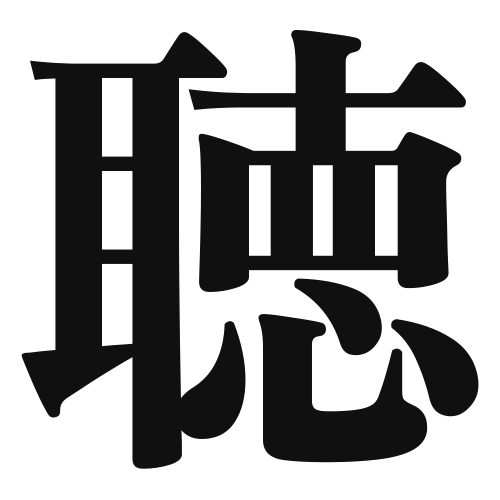1. Overview of Meaning
The kanji 聴 (pronounced “chou” in Japanese) means “to listen” or “to hear.” It emphasizes the act of actively listening, often with attention and understanding.
2. Formation and Radical
Formation of the Kanji: The kanji 聴 is a phonetic compound (形声文字) that combines the radical for “ear” (耳) with the phonetic component “青” (which can suggest a sound or color). This combination conveys the idea of hearing or listening.
Radical: The radical for 聴 is 耳, which means “ear.” This radical is commonly associated with words related to hearing and sound.
3. Examples of Usage
Common Words and Phrases: Some frequently used words that include 聴 are:
- 聴覚 (ちょうかく, “hearing ability”)
- 聴衆 (ちょうしゅう, “audience”)
- 聴取 (ちょうしゅ, “listening”)
Example Sentences in Daily Conversation:
- 音楽を聴くのが好きです。 (おんがくをきくのがすきです。) – “I like listening to music.”
- 彼の話を聴いてください。 (かれのはなしをきいてください。) – “Please listen to his story.”
4. Synonyms and Antonyms
Similar Kanji: A similar kanji is 聞 (pronounced “kiku”), which also means “to hear” or “to listen.” However, 聞 often implies passive hearing or asking for information, while 聴 suggests a more active engagement in listening.
Antonyms: An antonym for 聴 could be 無視 (むし, “to ignore”), which means to disregard or not listen to something or someone.
5. Cultural and Historical Background
Relation to Japanese Culture: The concept of listening is highly valued in Japanese culture, where attentiveness and respect during conversations are important. The kanji 聴 reflects this cultural significance.
Proverbs and Idioms: One relevant proverb is 耳にタコができる (みみにたこができる), which means “to hear something so often that it becomes tiresome.” This expression highlights the importance of listening and the potential for overexposure to certain sounds or messages.
